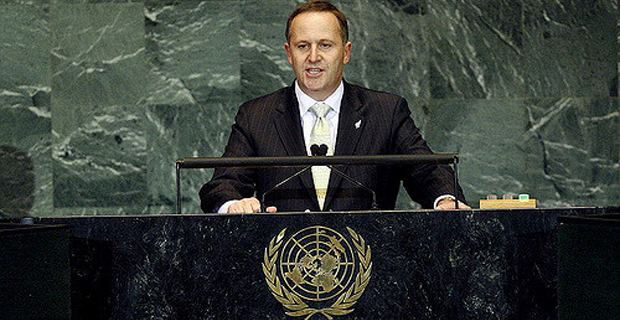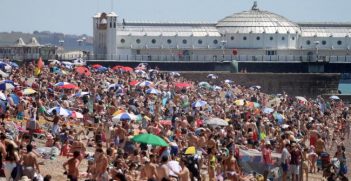John Key's Foreign Policy Legacy

New Zealand Prime Minister John Key surprised everyone when he resigned this week. He has been consistently popular over the last eight years and has seen the country through the Global Financial Crisis, the Christchurch earthquakes and a reconciliation with the US on foreign and defence policy.
John Key’s shock resignation on 5 December makes the 2017 New Zealand election result much more uncertain. Winston Peters, the leader of the populist New Zealand First party, will have good reason to think he will do better than he might have otherwise expected. Moreover, the new prime minister is unlikely to have quite the same affection in New Zealanders’ hearts as John Key.
I expect the National Party will be the largest party after the 2017 election, but it is unlikely to be close to the 50 per cent of the vote required to govern virtually alone with just one or two supporting MPs. So that is likely to put Winston Peters in the catbird seat, able to determine whether National will govern in coalition with New Zealand First, or whether there will be an uncomfortable alliance between Labour, the Greens on the left and Winston in the centre. However, all of that is in the future.
Key’s domestic legacy
John Key and National took office in late 2008, just as the Global Financial Crisis was breaking with full force. Labour had left a legacy of unsustainable promises and a spectre of ever-increasing deficits. The first task was to restore confidence. That meant winding back all Labour’s promises, but also ensuring that the crisis did not damage families and businesses too much. It meant boosting the economy with tax cuts, targeted infrastructure spending, and winding back a plethora of business-killing regulation—including freeing up employment law.
As a minister during this time, I recall the intensity of effort in those first few months. Each week the unemployment level would rise. But by mid-2010 positive results were coming through. However, it took quite a bit of government borrowing to get through the crisis, and to sustain economic activity.
Then in September 2010 and February 2011, the Christchurch earthquakes hit. Nearly 200 people were killed, the centre of the city was destroyed and several thousands of houses were uninhabitable. More billions needed to be borrowed, ultimately amounting to 10 per cent of New Zealand’s GDP.
More than anything, these two crises established John Key’s presence as a steady reassurance to the people of New Zealand, able to relate to virtually all sectors of society.
Since 2011 the economy has rebounded. The strict control on government spending has continued, but it has not involved radical cuts. There was no slash and burn. Instead a whole series of small decisions were made, freeing up many sectors of the economy, increasing investment, partially selling down state electrical company—making it clear to international investors that New Zealand is open for business. A predictable and careful style of management was exhibited by not only John Key, but also to his deputy and minister of finance, Bill English.
The results were: 3.4 per cent GDP growth—one of the highest growth rates in the OECD; unemployment under 5 per cent; and government surpluses measured in the billions. New Zealand has performed better than Australia over the last three years. The gap between the two countries has started to close, enough to make much of the New Zealand diaspora return home.
The world has noticed. John Key and Bill English are held up by many OECD countries as exemplars of sensible moderate leadership. New Zealand has also remained relatively immune from the siren call of populism. The crucial “right direction/wrong direction” poll consistently shows New Zealanders think their country is going in the right direction.
Key’s foreign policy legacy
For decades New Zealand has struggled in its relationship with the United States. Labour, with its deep-seated antipathy of the international role of the US and its nuclear guarantee, was unable to fix this. Although Helen Clark had pragmatically improved the relationship in the early 2000s, deep suspicion of the relationship remained within the Labour Party.
The National Party sought to restore a normal relationship with the US as the key foreign policy goal of the new government. This was largely to be carried out by Murray McCully as foreign minister, and by successive defence ministers. The process was carefully planned, initially from the opposition benches.
The first step was to positively affirm New Zealand’s nuclear free policy, done by John Key in his first major speech as Leader of the Opposition. This was done for two reasons, firstly because it was broadly popular with a wide range of New Zealanders across the political spectrum and, secondly, to remove all doubt in the US that the policy was open for negotiation.
This allowed for the normalisation of all other aspects of security policy between the two nations. New Zealand made sure it was playing a constructive and useful role in Afghanistan. Agreements were made in the foreign policy arena with the Wellington Declaration in 2010 and in the defence arena with the Washington Declaration in 2012.
By 2012, New Zealand ships were once again exercising with the US Navy in RIMPAC (Rim of the Pacific), the world’s largest multilateral maritime exercise. In 2016, after a gap of 32 years, a US destroyer visited New Zealand for the 75th commemoration of the Royal New Zealand Navy. The ship’s presence also allowed it to assist with recovery operations following the Kaikoura earthquake.
The relationship has been restored to the point where New Zealand is virtually a de facto ally of the US, but without the constraints of a formal alliance agreement. New Zealand considers this arrangement as providing it with much greater scope in implementing an independent foreign policy. Time will tell how important this will become during Trump’s years as president.
John Key is leaving office after eight years and opinion polls show 50 per cent support for the government compared to the mid-20s for Labour. This is a remarkable testament to the success of John Key and his style of government. The public have a sense that the ship of state has been steered safely through the shoals of economic turmoil toward a more secure place in the world.
John Key has perhaps exhibited an edge of populism in his personal style, but that has been part of his success. It staved off the attractions of truer and more turbulent populists. Also the Key brand of populism has ensured a personal connection remains with voters and allowed the unglamorous aspects of a “steady as she goes” government to be sustained.
The Hon Dr Wayne Mapp is a New Zealand law commissioner. From 2008 to 2011 he was New Zealand’s minister of defence and minister of science and technology.
This article is published under a Creative Commons Licence and may be republished with attribution.





